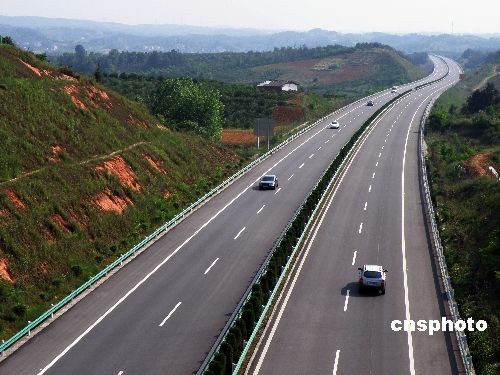Bones of contention
Despite the efforts by the central government and its local counterparts, there are still some tough obstacles to overcome.
Citong Bridge, for instance, the only bridge that collects tolls in Quanzhou, Fujian Province, is not under pressure from heavy traffic, while three other bridges across the Jijiang River are always jammed during rush hours.
Like many other expressways or bridges in China, the Citong Bridge was built by social capital raised by 15 small companies. Now they must repay their loans, which is the main reason for not shutting down the tollgate.
According to a notice at the tollgate, it charges 6 yuan (US$0.93) for each small vehicle crossing the bridge and 55 yuan (US$8.53) for any large vehicle weighing more than 15 tons.
Massive construction of China's transportation network started in 1984, when the central government approved a policy allowing loans for road construction which would be repaid through tolls collected over a specified period.
To reduce their fiscal burden, the provincial governments enlisted the help of social capital by founding expressway companies that allowed joint ventures, securitized ownership, direct private sector investment, and different forms of leasing and concessions.
According to the clean-up mission, ministries would eliminate various kinds of toll booths, including those on expressways where costs have been recovered, those built on Class B highways approved after June 20 in eastern and central provinces, and any booth set up along a closed highway, except for those built at provincial borders.
Citong Bridge is a typical case in terms of tollway management in China, in which the public is not informed of the deadline of the loan, making it difficult to know whether the tollgates are collecting fees legally or not.
Moreover, since the tollgates are managed by expressway companies rather than the government, the salaries of local employees often depend on the collection of tolls and fines.
Payment for staff members at an overload detection station in Henan Province all come from fines, Lei Junwei, an official from the highway administration in Zhumadian, told China News Service.
Lei's line was verified by one of the staff members, who told the reporter that their pay is always delayed, because they have to wait for more fines to be charged on overloaded trucks.
In China, expressway companies collecting tolls are directly linked to local governments. An investigative report by Nanfang Weekly showed that many board members at the 19 listed expressway companies are government officials from local transport departments.
In other words, local transport departments not only benefit from collecting tolls, but also decide on the amount of the tolls and how long an expressway company can collect them.
This fact has made many experts pessimistic about the effectiveness of the campaign. Wu Wenhua, deputy director of the comprehensive transport institute with the NDRC, said the campaign will intensify the "game-play" between central and local governments.


















